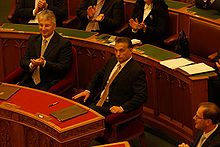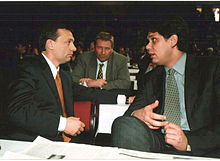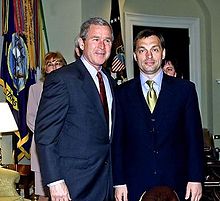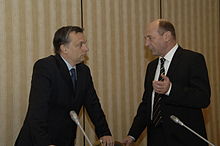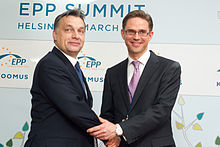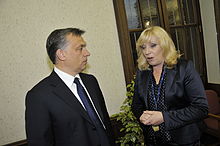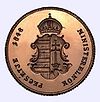- Viktor Orbán
-
The native form of this personal name is Orbán Viktor. This article uses the Western name order.
Viktor Orbán 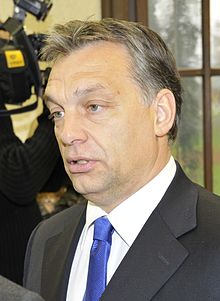
Orbán at the EPP summit (2010) Prime Minister of Hungary Incumbent Assumed office
29 May 2010President László Sólyom
Pál SchmittPreceded by Gordon Bajnai In office
8 July 1998 – 27 May 2002President Árpád Göncz
Ferenc MádlPreceded by Gyula Horn Succeeded by Péter Medgyessy Personal details Born 31 May 1963
Székesfehérvár, HungaryPolitical party Fidesz Spouse(s) Anikó Lévai (1986–present) Children Ráhel
Gáspár
Sára
Róza
FlóraAlma mater Eötvös Loránd University
Pembroke College, OxfordProfession Lawyer Religion Calvinism Website Official website Viktor Orbán (Orbán Viktor, Hungarian pronunciation: [orbaːn viktor]; born 31 May 1963) is a Hungarian centre-right conservative politician[1][2][3] and current Prime Minister of Hungary. He was also Prime Minister from 1998 to 2002 and is currently the leader of Fidesz, which in alliance with the Christian Democratic People's Party in the 2010 elections won 52.73% of the votes and a two thirds majority (supermajority) of seats in the parliament of Hungary.
Contents
Background
He was born on 31 May 1963 in Székesfehérvár and spent his childhood in two nearby villages, Alcsútdoboz and Felcsút. In 1977 his family moved to Székesfehérvár.
Orbán graduated from secondary school, at which he studied English language, in 1981. In the two year period after that he completed his military service, then studied law at Eötvös Loránd University in Budapest. After graduating from that institution in 1987 he lived in Szolnok for the next two years, commuting to Budapest where he had a job as a sociologist at the Management Training Institute of the Ministry of Agriculture and Food.
In 1991 Orbán received a scholarship from the Soros Foundation and spent a half year in Oxford, where he studied at Pembroke College.
Viktor Orbán is married to jurist Anikó Lévai. Orbán is a Calvinist Protestant, while maintaining good relations with the leaders of all the major churches in Hungary. Orbán and his wife have five children. He is very fond of sports, especially of football; he was a signed player of the Felcsút football team, and as a result he also appears in Football Manager 2006.
Political career
Orbán was a founding member of the Fidesz party (an acronym of FIatal DEmokraták SZövetsége which means "Alliance of Young Democrats" in Hungarian), which was formed on 30 March 1988. On 16 June 1989, Orbán gave a speech in Heroes' Square, Budapest, on the occasion of the reburial of Imre Nagy and other national martyrs of the 1956 Hungarian Revolution. In his speech he demanded free elections and the withdrawal of Soviet troops. The speech brought him wide national and political acclaim.[4] In the summer of 1989 he took part in the Opposition Roundtable negotiations.
In 1990 he became a member of the Hungarian parliament. Three years later, he became leader of Fidesz. In 1994, he transformed it from a social-liberal party (Fidesz was a member of Liberal International) into a right-wing conservative party after the collapse of the national right. In 1995 the party changed its name to Fidesz-MPP (Federation of Young Democrats – Hungarian Civic Party).
Orbán also holds the position of Vice President of the European People's Party (EPP) since October 2002.[5]
First premiership (1998–2002)
Fidesz-MPP won the 1998 parliamentary elections with 42% of the national vote, in alliance with the remnants of the Hungarian Democratic Forum (MDF) (the backbone of Hungary's first democratically elected government from 1990–94), promising improvements in the welfare system as an antidote to the bitter austerity program of the outgoing coalition government of the Hungarian Socialist Party (MSZP) and Alliance of Free Democrats (SZDSZ). Thus, Viktor Orbán became the second youngest Prime Minister of Hungary at 35 (after András Hegedüs), serving between 1998 and 2002.[6]
Orbán's economic policy was aimed at cutting taxes and social insurance contributions over four years while reducing inflation and unemployment. Among its first measures the new government abolished university tuition fees and reintroduced universal maternity benefits. The government announced its intention to continue the Socialist-Liberal stabilization program and pledged to narrow the budget deficit, which had grown to 4.5% of the GDP. The previous Cabinet had almost completed the privatization of government-run industries and had launched a comprehensive pension reform. The Socialists had avoided two major socioeconomic issues, however - reform of the health care and the agricultural system, these remained to be tackled by Orbán's government.
The new government immediately launched a radical reform of state administration, reorganizing ministries and creating a super-ministry for the economy. In addition, the boards of the social security funds and centralized social security payments were dismissed. Following the German model, Orbán strengthened the prime minister's office and named a new minister to oversee the work of his Cabinet. In the process thousands of civil servants were replaced (no distinction is made between political and civil servant posts, resulting in a strong "winner takes all" practice). The overall direction was towards centralized control.
Hungary gained substantial international exposure in May 1999 when, along with Poland and the Czech Republic, it joined NATO. Hungary was immediately called upon to make important decisions as an alliance member: the country opted to act as a passive participant in NATO's military intervention in Yugoslavia, its neighbour to the south, over the Kosovo crisis. This passive participation is widely seen as due to the poor state of the Hungarian armed forces.
Despite vigorous protests from the opposition parties, in February the government decided that plenary sessions of the unicameral National Assembly would be held only every third week. As a result, according to opposition arguments, parliament's legislative efficiency and ability to supervise the government were reduced. In late March the government's attempt to replace the National Assembly rule calling for a two-thirds majority vote with a simple majority, but this was ruled unconstitutional by the Constitutional Court.
At the same time, the Orbán cabinet continued to strengthen the prime-minister-led political system and introduced the new institution of the constructive vote of no confidence.
The year saw only minor changes in top government officials. Two of Orbán's state secretaries in the prime minister's office had to resign in May because of their implication in a bribery scandal involving the U.S. military manufacturer Lockheed Martin Corp. In advance of bids on a major jet-fighter contract, the two secretaries, along with 32 other deputies of Orbán's party, had sent a letter to two U.S. senators to lobby for the appointment of a Budapest-based Lockheed manager to be the U.S. ambassador to Hungary. On August 31 the head of the Tax Office also resigned, succumbing to protracted attacks by the opposition on his earlier, allegedly suspicious, business dealings. The tug-of-war between the Budapest city council and the government continued over the latter's decision in late 1998 to cancel two major urban projects: the construction of a new national theatre and of the fourth subway line.
Economic successes included a drop in inflation from 15% in 1998 to 10.0% in 1999, 9.8% in 2000 and 7.8% in 2001. GDP growth rates were fairly steady: 4.4% in 1999, 5.2% in 2000, and 3.8% in 2001. The fiscal deficit fell from 3.9% in 1999, to 3.5% in 2000 and 3.4% in 2001 and the ratio of the national debt was reduced to 54 percent of GDP. Under the Orbán cabinet there were realistic hopes that Hungary would be able to join the Eurozone by 2009. However, negotiations for entry into the European Union slowed in the fall of 1999 after the EU included six more countries (in addition to the original six) in the accession discussions. Orbán repeatedly criticized the EU for its delay. As of Q4 2009, Hungary still does not meet the criteria for joining the Eurozone.
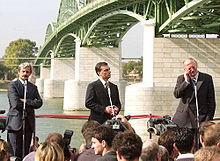 Mikuláš Dzurinda, Viktor Orbán and Günter Verheugen open the Mária Valéria Bridge across the Danube connecting the Slovak town of Štúrovo with Esztergom in Hungary.
Mikuláš Dzurinda, Viktor Orbán and Günter Verheugen open the Mária Valéria Bridge across the Danube connecting the Slovak town of Štúrovo with Esztergom in Hungary.
Relations between the Fidesz-led coalition government and the opposition worsened in the National Assembly, where the two seemed to have abandoned all attempts at consensus-seeking politics. The government pushed to swiftly replace the heads of key institutions, e.g. the Hungarian National Bank chairman, the Budapest City Chief Prosecutor, and appointed partisan figures as heads of the H.N. Bank, the Hungarian Radio and Chief Prosecutor. While the opposition attempted to resist, e.g. by delaying their appointing of members of the supervising boards, the government simply ignored it and ran the institutions without the stipulated number of directors. In a similar vein PM Orbán failed to show up for question time in parliament, for periods of up to 10 months. His statements of the kind that "The parliament works without opposition too..." also contributed to the image of an arrogant and aggressive governance.
Orbán also came under criticism for pushing through an unprecedented two-year budget and for failing to curb inflation, which only dropped a half point, from 10% in 1999 to 9.5% in 2000, despite the tight fiscal policy of the Central Bank. Investments, however, continued to grow.
Numerous political scandals during 2001 led to a de facto, if not actual, breakup of the coalition that held power in Budapest. A bribery scandal in February triggered a wave of allegations and several prosecutions against the Independent Smallholders' Party (FKGP). The affair resulted in the ousting of József Torgyán from both the FKGP presidency and the top post in the Ministry of Agriculture. The FKGP disintegrated and more than a dozen of its MPs joined the government faction, which looked like a major coup for PM Orbán.
The level of public support for political parties generally stagnated, even with general elections coming in 2002. Fidesz and the main opposition Hungarian Socialist Party ran neck and neck in the opinion polls for most of the year, both attracting about 26% of the electorate. According to a September 2001 poll by the Gallup organization, however, support for a joint Fidesz – Hungarian Democratic Forum party list would run up to 33% of the voters, with the Socialists drawing 28% and other opposition parties 3% each. Meanwhile, public support for the FKGP plunged from 14% in 1998 to 1% in 2001. As many as 40% of the voters remained undecided, however. Although the Socialists had picked their candidate for prime minister — former finance minister Péter Medgyessy — the opposition largely remained, unable to increase its political support.
The dark horse of the election was the radical nationalist Hungarian Justice and Life Party (MIÉP), with its leader István Csurka's radical rhetoric. MIÉP could not be ruled out as the key to a new term for Orbán and his party, should they be forced into a coalition after the 2002 elections.
Hungary attracted international media attention during the year for its passage of the s.c. "status law" concerning estimated three-million-strong ethnic Hungarian minorities in neighbouring (Romania, Slovakia, Serbia and Montenegro, Croatia, Slovenia and Ukraine). The law was aimed at providing education and health benefits as well as employment rights to those, and was said to heal the negative effects of the disastrous 1920 Trianon Treaty. Governments in neighbouring states, particularly Romania, claimed to be insulted by the law, which they saw as an interference in their domestic affairs. The proponents of the status law countered, that several countries criticizing the law have themselves similar constructs to provide benefits for their own minorities. Romania acquiesced after amendments following a December 2001 agreement between Orbán and Romanian prime minister Adrian Năstase; Slovakia accepted the law after further concessions made by the new government after the 2002 elections.
A later report in March by the Brussels-based International Federation of Journalists criticized the Hungarian government for improper political influence in the media as the country's public service broadcaster teetered close to bankruptcy.
The elections of 2002 were the most heated Hungary had experienced in more than a decade, and an unprecedented cultural-political division formed in the country. In the event, Viktor Orbán's group lost the April parliamentary elections to the opposition Hungarian Socialist Party, which set up a coalition with its longtime ally, the liberal Alliance of Free Democrats. Turnout was a record-high 73.5%.
Beyond these parties, only deputies of the Hungarian Democratic Forum made it into the National Assembly. The populist Independent Smallholders' Party and the right Hungarian Justice and Life Party (MIÉP) lost all their seats. The number of political parties in the new assembly was therefore reduced from six to four.
MIÉP challenged the government's legitimacy, demanded a recount, complained of election fraud, and generally kept the country in election mode until the October municipal elections. The socialist-controlled Central Elections Committee ruled that a recount was unnecessary, a position supported by observers from the Organization for Security and Cooperation in Europe, whose only substantive criticism of the election conduct was that the state television carried a consistent bias in favour of Fidesz.
In opposition (2002–2010)
Orbán was awarded the Freedom Award of the American Enterprise Institute and the New Atlantic Initiative (2001), the Polak Award (2001), the Grand Cross of the National Order of Merit (2001), the "Förderpreis Soziale Marktwirtschaft" (Price for the Social Market Economy, 2002) and the Mérite Européen prize (2004). In April 2004. he was awarded the Papal Grand Cross of the Order of Saint Gregory the Great.
In the 2004 European Parliament election, the ruling Hungarian Socialist Party was heavily defeated by the opposition conservative Fidesz. Fidesz gained 47.4% of the vote and 12 of Hungary's 24 seats.
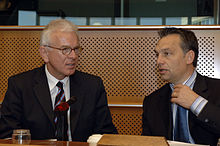 Orbán and Hans-Gert Pöttering in 2006.
Orbán and Hans-Gert Pöttering in 2006.
Some consider[citation needed] the election of Dr. László Sólyom as the new President of Hungary as the most recent success of the party. He was endorsed by Védegylet, an NGO including people from the whole political spectrum. His activity does not entirely overlap with the conservative ideals and he championed for elements of both political wings with a selective, but conscious choice of values.[7]
He was the candidate of Fidesz for the parliamentary election in 2006. Fidesz and its new-old candidate failed again to gain a majority in this election, which initially put Orbán's future political career as the leader of Fidesz in question.[8] However, on fighting with socialist-liberal coalition, his position has been solidified again, and he was elected president of Fidesz yet again for another term in May 2007.[9]
On 17 September 2006, an audio recording surfaced from a closed-door MSZP meeting which was held on 26 May 2006, in which Hungarian Prime Minister Ferenc Gyurcsány made a speech, notable for its obscene language. On November 1, Orbán and his party announced their plans to stage several large-scale demonstrations across Hungary on the anniversary of the Soviet suppression of the 1956 Revolution. The events were intended to serve be a memorial to the victims of the Soviet invasion and a protest against police brutality during the October 23 unrest in Budapest. Planned events included a candlelight vigil march across Budapest. However the demonstrations were small and petered out by the end of the year.[10] The new round of demonstrations expected in the Spring of 2007 did not materialize.
On 1 October 2006, Fidesz won the municipal elections, which counterbalanced the Socialist Party (MSZP)-led government's power to some extent. Fidesz won 15 of 23 mayoralties in Hungary's largest cities—although its candidate narrowly lost the city of Budapest to a member of the Liberal Party—and majorities in 18 out of 20 regional assemblies.[11][12]
A referendum on revoking government reforms which introduced doctor visit fees paid per visitation and medical fees paid per number of days spent in hospital as well as tuition fees in higher education took place in Hungary on 9 March 2008. Hungarian people usually call this popular vote social referendum.
The referendum was initiated by opposition party Fidesz against the ruling MSZP. The procedure for the referendum started on 23 October 2006, when Orbán announced they would hand in seven questions to the National Electorate Office, three of which (on abolishing co-payments, daily fees and college tuition fees) were officially approved on 17 December 2007 and called on 24 January 2008. It is assumed likely that the referendum will pass, but it is uncertain whether turnout will be high enough to make it valid;[13] polls indicate about 40% turnout with 80% in favour of rescinding the three reforms.[14]
In the 2009 European Parliament election, Fidesz had a big win, gaining 56.36% of the vote and 14 of Hungary's 22 seats.[15]
Second premiership from 2010
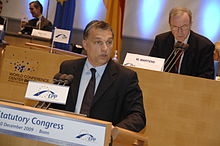 Orbán speaking at an EPP Congress in 2009
Orbán speaking at an EPP Congress in 2009
The European Parliament election results of 2009 foreshadowed a decisive victory in the 2010 parliamentary elections, where Fidesz won the outright majority in the first round on April 11, winning 206 seats, including all 119 individual seats. After the second round of the elections they won a total of 263 seats in the parliament (out of 386), which is enough to change the Hungarian constitution.[16] The new cabinet began working on legislation even before its inauguration. The sixth National Assembly was established on 14 May 2010. The representatives accepted a bill of dual citizenship, granting Hungarian citizenship to every Hungarian in the Carpathian basin and around the world, purportedly aimed at offsetting the harmful effects of the Treaty of Trianon, and sparking a controversy between Hungary and Slovakia. Though János Martonyi, the new foreign minister, visited his Slovak colleague to discuss the issue of dual citizenship, Robert Fico nonetheless stated that since Fidesz and the new government were not willing to negotiate the issue, which would be viewed as a question of national security. Ján Slota, Slovak government member and leader of the extreme right Slovak National Party, fears that Hungary wants to attack Slovakia and considered the situation as the "beginning of a war". As Prime Minister designate, Viktor Orbán firmly stated that he considers Slovak hysteria part of a political campaign. In response to the change in Hungarian citizenship law, the National Council of the Slovak Republic approved on 26 May 2010 a law stating that if a Slovak citizen applies for citizenship of another country then that person will lose his or her Slovakian citizenship.
Orbán took the oath of office on 29 May 2010. With 261 votes, the Hungarian Parliament accepted him as leader of the ninth government since the end of communism. The opposition parties (MSZP, Jobbik and LMP) did not accept the cabinet's program (107 votes).[17][18] His first international visit was to Poland, as a symbol of establishing a central European alliance. Polish-Hungarian friendship has a long historical tradition.[19]
In the autumn of 2010, Parliament passed a new media bill[20], setting up a new media council. The new members were immediately accused of being politically attached to Fidesz, since all members were elected by the two-third parliamentary majority. Their authority to supervise media, issue decrees, and issue fines of up to 200 million forints was also questioned, though all decisions of the council can be appealed at the Independent Court. The bill was widely criticized as jeopardizing freedom of the press in Hungary, however no specific provisions were named.[21]
The European Commission criticized Orbán's second cabinet for its lack of compliance with economic deficit goals in 2010 and 2011, the nationalization of the country's compulsory private pension scheme and the cutting of the salary of state employees, including the Hungarian National Bank's director, claiming the government potentially undermined the independence of that institution.[22]
Orbán's cabinet is to hold the presidency of the Council of the European Union from January to July 2011. Concerns have been raised about its performance, relating to the controversial media law just passed in 2010, the Euroscepticism of the ruling coalition, and the lack of preparation of civil servants due to pervasive political patronage.[22] Hungary's six-month presidency of Council launched in the European Parliament on 19 January 2011. Orbán put the economy at the top of the agenda for Hungary's six-month presidency of the Council of Ministers when he outlined his priorities to MEPs on Wednesday morning. The debate became quite heated at times as Orbán came in for criticism over Hungary's controversial media law.[23]
In 2010, a drafting process for a new constitution began to take place, was finalized by 11 April 2011, and was adopted by the Parliament on April 18.[24][25][26] It was signed into law by Pál Schmitt on April 25 and will go into effect on 1 January 2012. The new constitution, called Magyarország Alaptörvénye (Basic Law of Hungary), contains[27] an extended preamble called the National Creed which claims the period between 19 March 1944 (Nazi occupation of Hungary and 2 May 1990 (first free election since 1945) legally nonexistent.
The National Assembly passed a Fidesz constitutional amendment motion on 7 June 2011 that will effectively end early retirement for men. The amendment is primarily intended to send back to work retired law enforcement officers under 57 as well as those under 62 who are claiming disability benefits, but will not cut the preferential pensions of women, miners, chemists and artists. The Socialist Party declared its solidarity with the law enforcement unions and invited them to consultations to jointly formulate the basic principles that the Socialists could represent if they regain power. Jobbik said before the vote that it would appeal to the Constitutional Court on account of discrimination if law enforcement employees are deprived of their pensions.[28] Law enforcement and fire services unions said they would go ahead with a planned demonstration for June 16 as talks with the prime minister on June 8 morning failed to bring an agreement over pension changes. Géza Pongó, head of the Independent Union of Police Employees, and Judit Bárdos, head of the Union of Law Enforcement Employees, agreed that the government’s proposal for pension changes is unacceptable.[29] Two days earlier Orbán said in a TV interview concerning a series of demonstrations staged by trade unions of policemen, fire fighters, prison, guards and other employees in law-enforcement and disaster management, it was unacceptable if “keepers of public order throw smoke bombs or damage fire hydrants, thus violating laws and making threats.”[30]
Wen Jiabao, the Chinese Prime Minister, arrived on a two-day official visit to Budapest on 24 June 2011.[31] He was the first premier from China who visited Hungary since 1987 (when Hungary was still under communist rule). China will buy “a certain sum” of Hungarian government bonds and extend a one billion-euro credit line to Hungary, Wen Jiabao said in Budapest at a joint news conference with his Hungarian counterpart Orbán, who said Hungary had now entered into a new and major alliance with China.[32] The meeting had also controversies: deputy chairperson of parliament’s human right’s committee Tímea Szabó has called for the leaders of Budapest’s police force to give evidence to the committee in connection with their handling of people who protested in support of Tibet. Szabó told MTI in a statement on 25 June that she would investigate personally on what basis the immigration authority (BAH) had called in to its office Tibetan refugees who were living in Hungary legally and had residential and work permits. The Politics Can Be Different (LMP) deeply condemns the police’s treatment of Tibetan refugees and activists demonstrating in support of Tibet. The Help Tibet Society wrote in a separate statement that staff of the BAH on 24 June evening had taken in to the BAH office Tibetan refugees living in Hungary. Further, police had blocked demonstrators from the site of a visit by the Chinese premier.[33]
Viktor Orbán in the media
Viktor Orbán is usually depicted by foreign media as a mainstream Hungarian politician and mention his anti-communist past, while often labelling him a populist. They often voice economic concerns over his proposed growth-based economic reform ideas. In January 2007 The Economist criticised his "cynical populism and mystifyingly authoritarian socialist-style policies".[34]
The most stormy incidents generating indignation happened in 2001. That April Magyar Hirlap made public a letter written by a reader that stated, "the killing of Orbán would do good to our nation". Also that month on TV channel RTL Klub, reporter Tamás Frei interviewed a Russian hitman, asking him for how much money would he kill the Hungarian prime minister (then Orbán). Right-wingers thought it a provocative question. Later it turned out that the interview person wasn't a real hitman, but an actor paid by Frei.[35] After this scandal, RTL Klub apologised to Orbán, and the Luxembourgian owners of the channel began an inquiry. Frei subsequently lost his job (he now works at rival channel "TV2"). Political scientists and right-wing publicists call these phenomena "orban(o)phobia".[36][37]
A further method for the less favourable depiction of Viktor Orbán in left-wing Hungarian media is to hold him up to ridicule. The left-wing Saturday-night roundtable TV jokeshow Heti Hetes (which was popular during Fidesz's term of office) spends a significant part of its air time making fun of Viktor Orbán and the attitude of his followers, which they consider sentimentally patriotic and folksy. Parody and criticism of Orbán were similarly strong and organized over the Internet, mostly during his time as prime minister. One of the popular ridicule tactics is to affix humorous nicknames to him, such as: A Zorbán (The Grim Orbán), see more (Zorb a small dwarf); Viktátor (Viktor-dictator); Alcsúti Törpe (Dwarf of Alcsút, the village where Orbán spent his childhood, because he is relatively short in stature), etc. Currently - as Orbán has much more sympathy with the general public than the left-wing leaders - he is much less parodied in such ways. Nowadays Ferenc Gyurcsány has similar status (especially since 2006's speech of Őszöd). Nowadays Orbán is criticized more seriously by the public for his endeavors to control the Hungarian media.
According to his supporters, the way the major Western organs present the Alliance of Young Democrats (FIDESZ) is often biased and distorted as their correspondents mainly rely on information obtained from leading Hungarian liberal intellectuals who are staunch supporters of the Socialists and the Free Democrats. In reality, Standard and Poor's, the International Monetary Fund and other financial institutions are both financially and politically independent from the left wing of Hungary, the way they criticise Orbán's politics is more probably the result of their own analysis of the situation and their independent simulation of the theoretical results of his party's stated intended economic actions. The current parliamentary support for the expenditure-cutting and economy stimulus package of the current Government of Experts intended for reducing the harmful effects of the World Economic Crisis prevents the dissolution of Parliament and holding of early elections, although the supporting parties have lost all political and moral legitimacy by now in the eyes of those FIDESZ-supporters who are considered by some to be enraged for believing the current tax-lowering, social expenditure-increasing proposals of his party, the implementation of which is expected to cause faster rising state-debt by the above-mentioned two financial institutions, which in turn would cause devaluation and increased inflation of the currency according to different intellectuels.[38][39][40]
Trivia
He played the bit part of a footballer in the Hungarian family film Szegény Dzsoni és Árnika (1983).[41]
Orbán has played soccer from early childhood; he is currently one of the players and main financiers of Hungarian football club Felcsút FC.[42] He had a prominent role in the foundation of Ferenc Puskás Football Academy at Felcsút where can be found Hungarian football’s modern training facilities.[43] His only son, Gáspár Orbán learns and trains here.[44] FIFA president Sepp Blatter visited the facilities at the Puskás Academy in 2009. Blatter, together with the widow of Ferenc Puskás, as well as the founder of the Academy, Viktor Orbán, announced the creation of the new FIFA Puskás Award during that visit.[45]
In a recent interview Orbán stated that his favorite band is Creedence Clearwater Revival.[46]
References
- ^ "Hungary: One-party rule – Editorial". The Guardian (London). 5 January 2011. http://www.guardian.co.uk/commentisfree/2011/jan/05/hungary-one-party-rule.
- ^ Castle, Stephen (22 April 2002). "Populist premier set for defeat in Hungarian election". The Independent (London). http://www.independent.co.uk/news/world/europe/populist-premier--set-for-defeat-in--hungarian-election-657824.html.
- ^ http://www.wsws.org/articles/2011/apr2011/hung-a26.shtml
- ^ Orbán Viktor beszédének szövege Nagy Imre és mártírtársai újratemetésén 1989-ben Magyar Nemzet Online (mno.hu). Retrieved 2011-06-09
- ^ European People's Party - Presidency epp.eu. Retrieved 2011-06-09
- ^ Kormányfői múltidézés: a jogászok a nyerők zona.hu
- ^ (Hungarian) http://index.hu/politika/belfold/kernt8094/
- ^ Országos Választási Iroda - 2006 Országgyűlési Választások eredményei valasztas.hu
- ^ Ismét Orbán Viktor lett a Fidesz elnöke politaktika.hu
- ^ Gorondi, Pablo (27 February 2007) "Hungary's prime minister expects political tension but no riots on March 15 commemorations" Associated Press Worldstream
- ^ "VoksCentrum - a választások univerzuma". Vokscentrum.hu. http://www.vokscentrum.hu/onkorm/elemzo.php?jny=hun&mszkod=860001&mitmut=polgmjv. Retrieved 2010-04-17.
- ^ "http://www.taipeitimes.com/News/world/archives/2006/10/03/2003330242". Taipeitimes.com. 2006-10-03. http://www.taipeitimes.com/News/world/archives/2006/10/03/2003330242. Retrieved 2010-04-17.
- ^ "Hungarian president announces referendum date", Xinhua (People's Daily Online), 24 January 2008.
- ^ Hungary's ruling MSZP vows to stick to medical reforms despite referendum - People's Daily Online
- ^ "EP-választás: A jobboldal diadalmenete". EurActiv.hu. 2009-06-08. http://www.euractiv.hu/europai-parlament/hirek/ep-valasztas-a-jobboldal-diadalmenete-001723. Retrieved 2011-06-08.
- ^ "Országos Választási Iroda - 2010 Országgyűlési Választások" (in (Hungarian)). Valasztas.hu. http://www.valasztas.hu/. Retrieved 2010-04-17.
- ^ "Nyolc év után újra Orbán a miniszterelnök". index.hu. 2010-05-29. http://index.hu/belfold/2010/05/29/orban_viktor_a_miniszterelnok/. Retrieved 2010-05-29.
- ^ "Soli deo gloria" - megalakult a második Orbán-kormány
- ^ Varsóba vezetett Orbán Viktor első hivatalos külföldi útja fidesz.hu
- ^ english translation
- ^ Presseurop quoting Gazeta Wyborcza
- ^ a b EU Observer, Storms ahead for Hungarian EU presidency
- ^ Hungary's six-month presidency of Council launched in Parliament
- ^ Goulas Soup, Hungary's New Constitution, Economist, Apr 7th 2011 |
- ^ "Hungary's new constitution drafted by next March, says Fidesz official", politics.hu, 2 August 2010; accessed 18 August 2010
- ^ (German) „iPad“-Verfassung fordert Ungarn heraus euractiv.com; accessed 13 March 2011
- ^ Official text of the new Hungarian constitution, in English
- ^ "Parliament passes amendment effectively ending early retirement pensions for men", politics.hu, 7 June 2011; accessed 8 June 2011
- ^ "Law enforcement demo looms as early retirement talks fail", politics.hu, 8 June 2011; accessed 8 June 2011
- ^ "Orbán says gov’t committed to law enforcement pension changes despite widespread protests", politics.hu, 6 June 2011; accessed 8 June 2011
- ^ Chinese PM starts two-day visit on Friday, politics.hu, 24 June 2011; accessed 27 June 2011
- ^ Hungarian PM lauds relations with China after meeting with counterpart in Budapest, politics.hu, 27 June 2011; accessed 27 June 2011
- ^ Controversy over blocked Tibet protest during Chinese premier’s visit to Hungary, politics.hu, 27 June 2011; accessed 27 June 2011
- ^ "Stars and soggy bottoms". Economist.com. 2007-01-04. http://www.economist.com/daily/columns/europeview/displaystory.cfm?story_id=8491837. Retrieved 2010-05-29.
- ^ Valódi-e Frei bérgyilkosa? - Külföldi szakértők is vizsgálják a botrányos riportot Index.hu
- ^ Tihanyi Örs: Hatásos-e még az Orbán-fóbia?. MNO.hu (hungarian)
- ^ Az MSZP Orbán-fóbiája Nepszabadsag.hu.
- ^ How Populism Fuels a Financial Crisis by Alex Brandy (Wall Street Journal, 2009)
- ^ "Socialist leader says Fidesz raising Hungary's international risk profile (Politics.hu news portal)". Politics.hu. 2009-07-08. http://www.politics.hu/20090708/socialist-leader-says-fidesz-raising-hungarys-international-risk-profile. Retrieved 2010-05-29.
- ^ Around, Hungary. "Survey finds average Jobbik supporters uneducated, unemployed (Politics.hu news portal)". Politics.hu. http://www.politics.hu/20090710/survey-finds-average-jobbik-supporters-uneducated-unemployed. Retrieved 2010-05-29.
- ^ Szegény Dzsoni és Árnika (1983) - Full cast and crew IMDB.com
- ^ Orbán lenne a felcsúti focimese hőse origo.hu
- ^ Puskas Academy vidi.hu
- ^ NB II: Orbán fia őrült meccsen debütált, a Fradi Dragónerrel ikszelt - eredmények pepsifoci.hu
- ^ Sepp Blatter az Akadémián pfla.hu
- ^ Orbán Viktor még ma is a Creedence Clearwater Revival-ért rajong axel.hu
External links
Political offices Preceded by
Gyula HornPrime Minister of Hungary
1998–2002Succeeded by
Péter MedgyessyPreceded by
Gordon BajnaiPrime Minister of Hungary
2010–presentIncumbent Party political offices New office Leader of Fidesz
1993–2000Succeeded by
László KövérPreceded by
János ÁderLeader of Fidesz
2003–presentIncumbent Current members of the Second Cabinet (Cabinet of the National Cooperation) of Hungarian Prime Minister Viktor Orbán Prime Minister Viktor Orbán - FIDESZDeputy Prime Minister, Minister without portfolio Zsolt Semjén - KDNPDeputy Prime Minister, Minister of
Public Administration and JusticeMinister of Interior Sándor Pintér - non-partyMinister of Defence Minister of Foreign Affairs János Martonyi - non-partyMinister of National Economy György Matolcsy - FIDESZMinister of National Resource Miklós Réthelyi - non-partyMinister of National Development Tamás Fellegi - non-partyMinister of Rural Development Sándor Fazekas - FIDESZPrime Ministers of Hungary since 1848 Revolution of 1848 Kingdom of Hungary Transition period M. Károlyi · Berinkey · Garbai · Peidl (opposed by G. Károlyi · Pattantyús-Ábrahám) · Friedrich · HuszárRegency Transition period Communist Hungary Republic of Hungary Italics indicates interim holder European Council List of meetings · President · Party composition (1999 • 2000 • 2001 • 2002 • 2003 • 2004 (Jan–Apr) • 2004 (May–Dec) • 2005 • 2006 • 2007 • 2008 • 2009 • 2010 • 2011)  Van Rompuy (President) ·
Van Rompuy (President) ·
 Faymann ·
Faymann ·  Leterme ·
Leterme ·  Borisov ·
Borisov ·  Christofias ·
Christofias ·  Nečas ·
Nečas ·  Thorning-Schmidt ·
Thorning-Schmidt ·  Ansip ·
Ansip ·  Katainen ·
Katainen ·  Sarkozy ·
Sarkozy ·
 Merkel ·
Merkel ·  Papademos ·
Papademos ·  Orbán ·
Orbán ·  Kenny ·
Kenny ·  Berlusconi ·
Berlusconi ·  Dombrovskis ·
Dombrovskis ·  Grybauskaitė ·
Grybauskaitė ·  Juncker ·
Juncker ·  Gonzi ·
Gonzi ·
 Rutte ·
Rutte ·  Tusk ·
Tusk ·  Passos Coelho ·
Passos Coelho ·  Boc ·
Boc ·  Radičová ·
Radičová ·  Pahor ·
Pahor ·  Zapatero ·
Zapatero ·  Reinfeldt ·
Reinfeldt ·  Cameron ·
Cameron ·
 Barroso
Barroso
European Union Portal Categories:- 1963 births
- 20th-century Hungarian people
- Alumni of Pembroke College, Oxford
- Calvinist politicians
- Conservatism in Hungary
- Current national leaders
- Fidesz – Hungarian Civic Union politicians
- Hungarian Calvinists
- Hungarian footballers
- Hungarian lawyers
- Hungarian politicians
- Hungarian Protestants
- Living people
- Members of the National Assembly of Hungary
- People from Fejér County
- Prime Ministers of Hungary
- Politicians of the European People's Party
Wikimedia Foundation. 2010.

